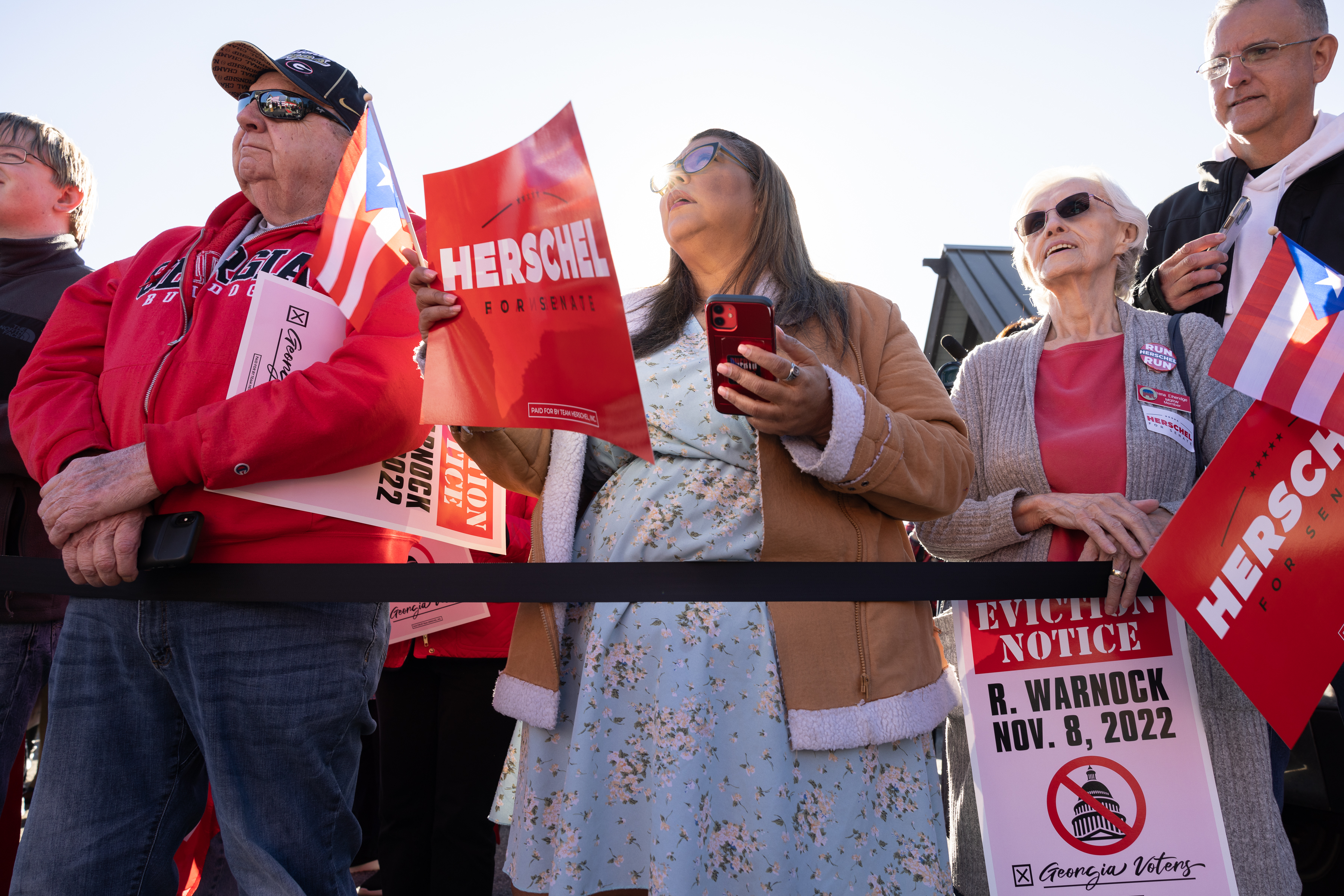Warnock, Walker and Georgia's Messy Midterm Election
One of the tightest races in this year’s midterm elections could decide who controls the Senate next year.


Profit and prosper with the best of Kiplinger's advice on investing, taxes, retirement, personal finance and much more. Delivered daily. Enter your email in the box and click Sign Me Up.
You are now subscribed
Your newsletter sign-up was successful
Want to add more newsletters?

Delivered daily
Kiplinger Today
Profit and prosper with the best of Kiplinger's advice on investing, taxes, retirement, personal finance and much more delivered daily. Smart money moves start here.

Sent five days a week
Kiplinger A Step Ahead
Get practical help to make better financial decisions in your everyday life, from spending to savings on top deals.

Delivered daily
Kiplinger Closing Bell
Get today's biggest financial and investing headlines delivered to your inbox every day the U.S. stock market is open.

Sent twice a week
Kiplinger Adviser Intel
Financial pros across the country share best practices and fresh tactics to preserve and grow your wealth.

Delivered weekly
Kiplinger Tax Tips
Trim your federal and state tax bills with practical tax-planning and tax-cutting strategies.

Sent twice a week
Kiplinger Retirement Tips
Your twice-a-week guide to planning and enjoying a financially secure and richly rewarding retirement

Sent bimonthly.
Kiplinger Adviser Angle
Insights for advisers, wealth managers and other financial professionals.

Sent twice a week
Kiplinger Investing Weekly
Your twice-a-week roundup of promising stocks, funds, companies and industries you should consider, ones you should avoid, and why.

Sent weekly for six weeks
Kiplinger Invest for Retirement
Your step-by-step six-part series on how to invest for retirement, from devising a successful strategy to exactly which investments to choose.
Control next year of the Senate, currently evenly split between the parties, could come down to a few thousand votes in Georgia. Democratic Sen. Raphael Warnock is facing an extremely tough challenge from Republican Herschel Walker, a political newcomer with strong backing from former President Trump.
With the polls and political handicappers showing essentially a dead heat, we recently traveled around the Peach State and spoke with dozens of voters to get a better sense of what’s on their minds and how the race is leaning.
For the first time ever in Georgia, two black men won their parties’ nominations for a Senate seat. But in the black community, in cities and small towns, there is no doubt who has the upper hand. It’s Warnock, by a wide margin. Hardly any black voters had a kind word to say about Walker, despite his legendary status as a Heisman Trophy-winning University of Georgia running back in the early 1980s.
From just $107.88 $24.99 for Kiplinger Personal Finance
Become a smarter, better informed investor. Subscribe from just $107.88 $24.99, plus get up to 4 Special Issues

Sign up for Kiplinger’s Free Newsletters
Profit and prosper with the best of expert advice on investing, taxes, retirement, personal finance and more - straight to your e-mail.
Profit and prosper with the best of expert advice - straight to your e-mail.
Rural vs. urban matters
Interest in the race among black voters seems to hinge more on a dislike for Walker than enthusiasm for Warnock, a potentially worrying scenario for the Democrat, as positive support tends to drive voter turnout more than dislike of the opposing candidate.
Not surprisingly, liberal-leaning Atlanta and its close suburbs are Warnock territory. And with about 30 percent of the state’s population living in the Atlanta metro area, that’s a lot of potential votes for the incumbent.
But there’s a far different sentiment outside the capital city. In rural and small-town Georgia, Walker is immensely popular among white voters. In fact, it’s almost universal, aside from college towns like Athens, home to the state’s flagship university. Here, white voters appear energized by Walker’s campaign and seem eager to vote.
Time and time again, we heard Republican voters say they like Walker because he shares their conservative values. And Trump’s backing of Walker certainly helps in this regard, many said.
Walker, who has struggled with gaffes on the campaign trail, also performed reasonably well during the race’s only debate this month, helping quell worries in the Republican Party that he isn’t ready for prime time.
Will GOP voters stay home?
Another major motivator for Republicans is to “correct” the 2020 Senate elections. Because of a mid-term retirement, Georgia that year held two Senate elections. In normal years, the Democratic candidates would’ve faced a tough – and possibly insurmountable – path to victory. But many GOP voters stayed home in the two runoff contests held weeks after the November election as a protest of what they said was a “stolen” win for Joe Biden. They look at Warnock and fellow Democratic Sen. Jon Ossoff as “fluke” winners and vow that such a scenario won’t happen again.
Still, we did meet some voters from each party who said they’re not completely impressed by either candidate and will vote for the “lesser of two evils” – though that “lesser” candidate almost always matched those voters’ party preferences. We also ran across a few folks who said they’re disgusted with politics and won’t vote, though only a small handful.
Political baggage carried by both candidates doesn’t seem to matter much to their supporters. Pro-life Walker has been accused of paying for abortions for multiple women, which he denies. And Warnock has been involved in a messy divorce, with his wife accusing him of running over her foot with his car, which he also denies. In an earlier era, these alleged transgressions would’ve disqualified both from winning. But not now, as neither candidate’s base seems bothered much by the allegations.
For governor, Abrams looks strong
The governor’s race should help increase voter turnout this year, since it’s on the minds of voters as much as, or possibly more, than the Senate race. We sensed more enthusiasm among Democratic voters for Stacey Abrams, the party’s nominee, than for Warnock. While not a flattering position for the senator, this should help boost turnout for him. Conversely, we witnessed outsized disdain among Republican voters for Abrams. While most like GOP candidate Brian Kemp, they loathe Abrams and fear she would pull the state far more to the political left than Warnock would be capable of doing in the Senate.
Beyond the candidates, the race also is a proxy battle for political supremacy in Georgia. In short, the candidates on the ballot seem to matter less than the parties they represent, a scenario we’ve seen repeated across the country in the past few election cycles. More than one Republican told us that if Democrats win in November, they’ll move from the state. Political power sharing isn’t an option in the modern winner-take-all mood of voters of both parties, in Georgia and elsewhere.
One thing to keep in mind is that the Senate winner may not be decided until a January runoff. Per Georgia election law, a runoff is triggered if neither candidate wins 50%, a plausible scenario, since Libertarian Senate candidate Chase Oliver could be a wildcard and siphon off enough votes to prevent either candidate from clearing the 50% bar.
So, who will win? Warnock does have a slight edge in polling, though polling has been frustratingly unreliable in recent elections and shouldn’t be used as a clear benchmark for how the race will end up. And in many of those polls, Warnock’s lead has shrunk in recent weeks to within the margin of error. But early voting is already underway in Georgia, so time is running out. At this point, we have to rate the race as a tossup, though a lot can – and may – happen between now and Election Day that could change our forecast.
Profit and prosper with the best of Kiplinger's advice on investing, taxes, retirement, personal finance and much more. Delivered daily. Enter your email in the box and click Sign Me Up.

Sean Lengell covers Congress and government policy for The Kiplinger Letter. Before joining Kiplinger in January 2017 he served as a congressional reporter for eight years with the Washington Examiner and the Washington Times. He previously covered local news for the Tampa (Fla.) Tribune. A native of northern Illinois who spent much of his youth in St. Petersburg, Fla., he holds a bachelor's degree in English from Marquette University.
-
 How Much It Costs to Host a Super Bowl Party in 2026
How Much It Costs to Host a Super Bowl Party in 2026Hosting a Super Bowl party in 2026 could cost you. Here's a breakdown of food, drink and entertainment costs — plus ways to save.
-
 3 Reasons to Use a 5-Year CD As You Approach Retirement
3 Reasons to Use a 5-Year CD As You Approach RetirementA five-year CD can help you reach other milestones as you approach retirement.
-
 Your Adult Kids Are Doing Fine. Is It Time To Spend Some of Their Inheritance?
Your Adult Kids Are Doing Fine. Is It Time To Spend Some of Their Inheritance?If your kids are successful, do they need an inheritance? Ask yourself these four questions before passing down another dollar.
-
 Trump $10B IRS Lawsuit Hits an Already Chaotic 2026 Tax Season
Trump $10B IRS Lawsuit Hits an Already Chaotic 2026 Tax SeasonTax Law A new Trump lawsuit and warnings from a tax-industry watchdog point to an IRS under strain, just as millions of taxpayers begin filing their 2025 returns.
-
 The New Fed Chair Was Announced: What You Need to Know
The New Fed Chair Was Announced: What You Need to KnowPresident Donald Trump announced Kevin Warsh as his selection for the next chair of the Federal Reserve, who will replace Jerome Powell.
-
 Trump Reshapes Foreign Policy
Trump Reshapes Foreign PolicyThe Kiplinger Letter The President starts the new year by putting allies and adversaries on notice.
-
 Congress Set for Busy Winter
Congress Set for Busy WinterThe Kiplinger Letter The Letter editors review the bills Congress will decide on this year. The government funding bill is paramount, but other issues vie for lawmakers’ attention.
-
 The December CPI Report Is Out. Here's What It Means for the Fed's Next Move
The December CPI Report Is Out. Here's What It Means for the Fed's Next MoveThe December CPI report came in lighter than expected, but housing costs remain an overhang.
-
 The Kiplinger Letter's 10 Forecasts for 2026
The Kiplinger Letter's 10 Forecasts for 2026The Kiplinger Letter Here are some of the biggest events and trends in economics, politics and tech that will shape the new year.
-
 Special Report: The Future of American Politics
Special Report: The Future of American PoliticsThe Kiplinger Letter The Political Trends and Challenges that Will Define the Next Decade
-
 The November CPI Report Is Out. Here's What It Means for Rising Prices
The November CPI Report Is Out. Here's What It Means for Rising PricesThe November CPI report came in lighter than expected, but the delayed data give an incomplete picture of inflation, say economists.